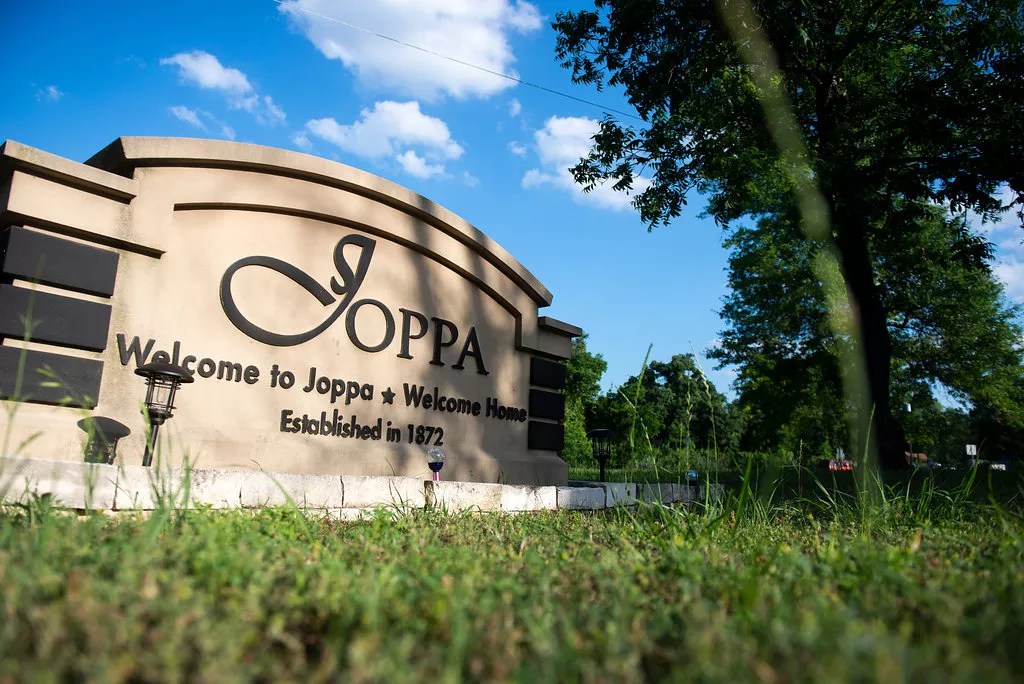
Brian Maschino

Audio By Carbonatix
Alicia Kendrick said she doesn’t live close to the TAMKO asphalt shingle factory in Joppa, but she can still smell it throughout the neighborhood. “You can smell the air from the factory all the way around,” she said. Kendrick is a resident of Joppa and a staffer with the neighborhood group Justice for Joppa/Justicia para Joppa.
The group recently sent an email to code enforcement staff and other officials claiming that the city has overlooked an important permit required for the factory to operate.
The TAMKO asphalt shingle factory takes up nearly the entire length of Joppa’s current western boundary, according to a press release from the group. The factory has been spewing out various kinds of air pollution over the decades, including 21 tons of particulate matter, 24 tons of sulfur dioxide and 46 tons of volatile organic compounds in 2022.
In their email to the city, the group’s co-chairs, Julio Chapparo and Emmanuel Davis, said that based on a 1987 overhaul of Dallas’ city code, “TAMKO requires a specific use permit to operate their potentially incompatible industrial use.” After extensive searching, neither city staff nor the group could find records at City Hall proving that the factory obtained this specific use permit, the group says. The group said the 1987 overhaul of the city code that affected TAMKO is the same one that made the West Dallas GAF shingle factory a nonconforming use, meaning it’s incompatible with its zoning.
“It seems like certain industries get a pass, just like GAF and these guys.” – Alicia Kendrick, Justice for Joppa/Justicia para Joppa
According to Justice for Joppa/Justicia para Joppa, even though the TAMKO factory sits on land that was zoned for industrial/manufacturing in 1987, a specific use permit was still required for a site that produces asphalt products. In 1987, TAMKO took ownership of the then-30-year-old factory and began operations just months before the city code overhaul. But the overhaul was retroactive to a date prior to TAMKO’s filed paperwork. Because of this, TAMKO must have a specific use permit to operate in Joppa, the group says.
The group is urging the city to shut down the factory until it has this permit. The city declined to comment, directing us to file an open records request.
Reached for comment, Kim Eckerman, a spokesperson for the shingle company, said that Downwinders at Risk and Justice for Joppa/Justicia para Joppa have it all wrong from start to finish. “Contrary to what the press release says, TAMKO Building Products LLC’s asphalt shingle manufacturing factory was lawfully established many decades ago,” Eckerman said by email. “Therefore, TAMKO does not need a specific use permit (SUP).”
Eckerman said Southwest Building Products acquired the property in 1945 and appraisal records show that most of the structures on the site were built in 1946. Southwest Building Products sold the property to another asphalt shingle manufacturer in 1947, which sold the property to TAMKO in March 1985, Eckerman said.
In July 1985, TAMKO obtained its first certificate of occupancy to produce asphalt roofing products on the property. Eckerman said the property was zoned as an industrial district, “and city staff correctly determined that no [specific use permit] was required.” In 1987, the city enacted a new zoning ordinance that requires a specific use permit to establish a potentially incompatible industrial use. But, Eckerman said, that ordinance didn’t take effect in the southeast quadrant of the city until July 1989.
“For these reasons, the city of Dallas correctly determined more than 38 years ago that TAMKO is not required to obtain a [specific use permit] to continue operating the asphalt shingle manufacturing factory on the property,” Eckerman said,
adding that by the end of the year, TAMKO will have finished construction on a five-year, $25-million environmental upgrade project at its Dallas facility. “These changes, taken together, will reduce emissions, including [particulate matter], sulfur dioxide and [volatile organic compounds] emissions,” Eckerman said.
This comes as the U.S. Environmental Protection Agency adopts new standards tightening the amount of particulate matter permitted in the air annually. Formerly, the agency allowed 12 micrograms per cubic meter to be emitted into the air, but now it’s 9 micrograms per cubic meter. According to The Texas Tribune, several Texas counties, including Dallas, already have particulate matter levels that exceed the new standard. The EPA says the change will prevent 4,500 premature deaths and 290,000 lost workdays, and yield $46 billion in net health benefits in 2030.
“This final air quality standard will save lives and make all people healthier, especially within America’s most vulnerable and overburdened communities,” EPA Administrator Michael S. Regan said in a press release Wednesday.
According to The Dallas Morning News, a study last year found that Joppa residents are exposed to two to three times as much air pollution as the rest of the city. They also experience higher rates of respiratory illness. The environmental justice group Downwinders at Risk says the pollution comes from the TAMKO factory, the Union Pacific Switchyard and other industry in the neighborhood.
Kendrick, also a staffer for Downwinders at Risk, said the city has yet to respond to the allegations. “We don’t get many responses at all from the city,” Kendrick told the Observer.
Kendrick said code compliance staff are always in the neighborhood to check up on things, but they somehow overlooked TAMKO’s lack of a specific use permit. “It seems like certain industries get a pass, just like GAF and these guys,” she said. “It’s not a one-off issue. It’s an issue with the city.”
She said the issue is simple.
“It’s honestly kind of black and white, either get the [specific use permit] or move,” Kendrick said. She said the group will fight the company if it applies for the permit because the ultimate goal is to run it out of town. “That’s the whole desire,” Kendrick said. “We’re going to continue to apply pressure.”